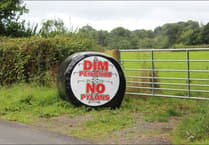It is fantastic news for rural Wales that the introduction of the Sustainable Farming Scheme has been delayed by a year. The Welsh Government has finally listened to reason, although with the level of protest they probably had little choice. As it stood, SFS was at best half baked. Some correspondents to this newspaper claimed that it was more generous than the English equivalent. They couldn’t have known that since Lesley Griffiths had refused to put any figures on the scheme! Moreover, the SFS was a “one size fits all” take it or leave it offer, whereas the English scheme was “pick and mix” allowing farmers to do what was right and best for their farm.
Huw Irranca Davies, our new Rural Affairs Minister, has set up a Round Table which he will chair. He seems to understand the urgency of getting to grips with the detail. He also seems committed to dealing with the farming unions rather that self-selecting focus groups, who may end up over representing vociferous minorities.
My own Union, NFU Cymru have been working tirelessly on this (as have the Farmers Union of Wales and others. NFU Cymru maintains strict political neutrality and seeks to offer solutions rather than just whinge and moan. Their quiet hard work has paid off (at least for now) and everyone who is involved in the rural economy owes NFU Cymru President Aled Jones and his team a very big debt of thanks.
With the Drums of War beating louder by the week, I think we will all come to realise that giving up 20 per cent of our productive land would have been an enormous act of self-harm. Humans can’t eat trees! At least one Labour politician gets that.
The BMA has lost its way
It’s interesting to compare the approach of my current union (NFU Cymru) with my previous union, the British Medical Association. I joined the BMA as a student and maintained my membership until after I had retired from surgery. Initially the BMA was (like the NFU) apolitical. They did a great job representing members and talking for the profession. That is what unions should do. In recent years the BMA has allowed itself to be taken over by those with a political axe to grind. This is overt in the Junior Doctors pay dispute. I fear that the BMA will come to regret this, and find that its ability to lobby and influence things diminishes rapidly. It doesn’t help the NHS either.
Our money is being wasted
It will always be true that money can’t be spent twice. So when we see taxpayers’ money squandered it’s helpful to understand what Wales then has to go without. An article in Wales Online at the end of January revealed the true costs of common medical procedures done by the NHS in Wales. Remember health care costs a lot, however often Labour politicians and others wish to tell us it’s “free”!
Knee and Hip replacements come in at just under £9,500. For ease let’s call that 10 grand. So for every million pounds wasted, that’s one hundred Welsh patients who don’t get a desperately needed pain relieving operation. On top of their misery, either they can’t work or they may require expensive care, so the hit to the economy and the taxpayer multiplies.
The blanket 20mph scheme cost £32 million and I reckon another £16 million to partially undo it. So that’s 4800 Welsh patients going without much needed surgery. £18 million per annum on an expanded Senedd means that every year another ,Welsh patients struggle on in pain and misery, and through no fault of their own, deprive the economy in one way or another.
What a daft way to run a country! Maddening too for a community like Llangwyryfon, where they are fighting to keep open their local school. Let’s not hear any more whining about howWestminster isn’t giving Wales enough money, until every pound is spent wisely.
Some common ground
I suspect Elly Foster (Are there other ways of caring for our elderly? Green Space, Cambrian News, 15 May) and I come at life from a different political perspective. But Elly is bang on to ask this question. Because we have been brainwashed into believing the NHS is free, we have just parked Adult Social Care in the healthcare slot, believing that it will magically happen. In doing so, as Elly says, we have put it in the hands of bureaucrats with the inevitable rules, regulations inspections etc etc. This dramatically adds to the cost. Ask any care home manager.
We simply have to find a better way to do this, and it needs some serious joined up thinking right across government. Getting old isn’t a health problem; it’s an inevitability. Dignified care doesn’t have to be institutionalised or run by the state.



